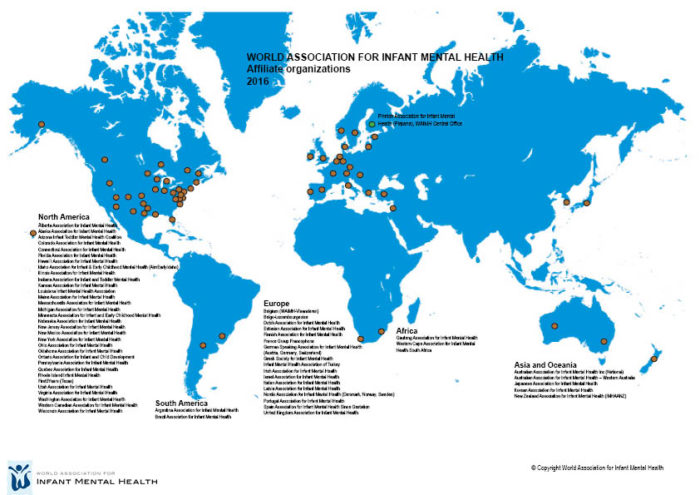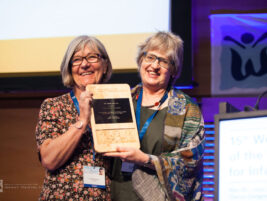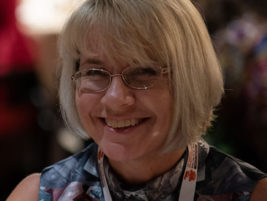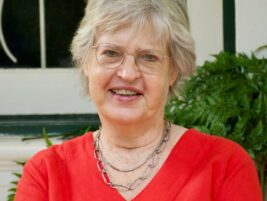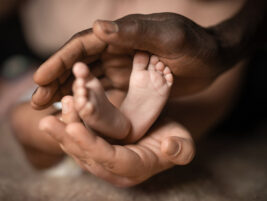The Japanese affiliate of World Association for Infant Mental Health (WAIMH), namely the Japanese Association for Infant Mental Health (JAIMH) was born at long last in April 2014 after a continuous thinking through over the past ten years.
Our participation in the WAIMH dates back to August 1986, when Hisako Watanabe presented her paper on Dr. Brazelton’s panel at the 3rd World Congress of the WAIPAD (the predecessor of WAIMH) in Stockholm, Sweden. There, Dr. Brazelton reminded her of exquisitely smooth features of infant–centered non-verbal communication in Japanese families he was studying then in the Goto Islands off the coast of Kyushu. His reminder combined with an eye-opening presentation of microanalysis of motherinfant therapy by Dr. B. Cramer and Dr. D. Stern ignited her interest in closely observing infants and mothers in the consultation room, using a video camera. She identified interactional sequences and nodal points, which comprised moments of transgenerational transmission of unresolved family trauma. Her case analysis was fortunately supervised by Drs B. Cramer, B. Emde, J. Call and others in the Pacific Rim Congress of the WAIPAD in 1988, in Hawaii, where professors and researchers from different universities in Japan came together for the first time.
Between 1988 and 1993, H. Watanabe had opportunities to participate in a collaborative international symposium of the French Parliament and WAIMH named “Infant Development and Working Mothers”, attend an infant observation course at the Tavistock Clinic, and share her video cases at a course by S. Acquarone in London and by Mara Sidoli in Santa Fe and others. Through these opportunities, it dawned on her that relationship-based infant mental health (IMH) approach needed to be disseminated among a wider range of infancy–related disciplines in Japan.
On her return to Japan in 1993, she joined Japanese psychoanalysts to host a successful WAIMH Tokyo Regional Meeting in 1994. There again, she wished to connect the world experts on IMH to active IMH workers in Japan. Dr. B. Cramer responded to her wish and volunteered to travel together with his wife to Kochi, a remote city in the Shikoku Island, where a neonatologist Dr. Kei Sawada, was struggling to promote a relationshipbased culturally-rooted IMH practice in his community. Dr. Cramer’s eye-opening lecture and active interaction with IMH workers and families in Kochi promoted interest in the local government. In the following year of 1995, the Mayor of Kochi, who was aware of increasing complexities of childrearing in rapidly industrializing Japanese society, visited Dr. Cramer’s Institute of IMH in Geneva. This facilitated IMH workers of Kochi and other areas of Japan to participate in the 6th Tampere Congress in 1996. The participants subsequently formed the FOUR WINDS (Forum Of Universal Research and Workings of Neonatal Developmental Support: hereafter FW) in Japan in 1997.
The name FW derives from the traditional Four Winds hat in Lapland that the group visited during the Tampere Congress. The four–colored pointed hat denotes four winds which intuitively guide Laplanders on reindeer sleighs through their journey across dark snow-covered land. It symbolizes the spirit of free encounter and harmonious companionship among IMH professionals and workers, the latter often struggling on their own.
Over the past 17 years, the FW has developed into an active forum of sharing of IMH knowledge and experiences. The first 11 years of the FW entailed a hard work in building an ambience of reciprocity, mutuality and collaboration for professionals and workers from different disciplines, which itself was an innovation in our hierarchical society, inviting at first undue prejudice and criticism.
Each year, however, we were extremely fortunate to have excellent lecturers from abroad, who were well-attuned to Japanese culture, teaching theories and practice on attachment, intersubjectivity, transgenerational transmission, communicative musicality and other key concepts of IMH. Gradually, the FW members came to be more reflective on ourselves and on our own culturallycentered experiences, including those of Amae, a Japanese cultural interpersonal mode of being.
In 2008, the FW played a major role in hosting the 11th WAIMH World Congress in Yokohama, which enhanced the morale of the FW members. During her visit to the 13th FW annual meeting in 2010, Dr. A. Lieberman gave lucid talks on deep sufferings of infants exposed to severe parental disharmony, which evoked a deep sense of responsibility in IMH workers to silently suffering infants. In March 2011, the Great Tohoku Disaster took place and Dr. D. Weatherston who was invited for the 14th FW meeting later that year, struck a chord in FW members with her thought-provoking lecture on reflective practice. Further in 2013, presentation and supervision by Drs. Elizabeth and Kaspars Tuters in Hiroshima and Tokyo deeply moved people who listened. Hitherto reticent survivors of wartime trauma of Hiroshima, Nagasaki and Okinawa started to speak out and share their stories. Accumulation of such enriching experiences among IMH workers culminated in their bottom-up request for an IMH training program with a culture sensitive reflective framework. A pilot study in collaboration with the Michigan Association for Infant Mental Health’s endorsement system (IMH-ER) is now underway.
Starting from a small group of founding members, the FW has grown into a national forum of 400 members from multiple disciplines committed to infants and families. Now it embraces a board of 24 highly-trusted regional leaders, eager to tackle with difficult problems with relationship-based multidisciplinary collaborative community team. The FW acted swiftly and effectively when, on 11th of March in 2011, the Great Tohoku (Northeastern) Disaster of earthquake, tsunami and ensuing radiation pollution occurred. It destroyed vast coastal regions of Iwate, Miyagi and Fukushima prefectures, among which especially devastated was Fukushima, which was inflicted by unprecedented complex disaster of tsunami and radiation contamination, nationwide stigma and ensuing national neglect and oblivion. Now into the fourth year of the aftermath, the post-disaster regions suffer from slow and difficult recovery. This landscape, compounded by increasing problems that are prevalent throughout Japan such as domestic violence, infant abuse, dysfunctional families, infertility and others urges us to promote IMH in a more vigorous way.
Thus after a thorough thinking through within the FW and among individual IMH professionals, we decided to establish a Japanese Association for Infant Mental Health as an affiliate of WAIMH. Already during the 9th WAIMH Congress in Melbourne in 2004, the Japanese congress participants got together to discuss this issue. The common goal agreed there was to form an affiliate to disseminate scientific knowledge and practice of relationshipbased intersubjective understanding of the minds of infants and families to a wider population and disciplines throughout Japan. The first agenda of JAIMH will be to update knowledge of IMH theory and practice to universities and colleges where classic medical model and single-person psychology still prevail. Also we will reach out to judicial systems where infants are regarded as a helpless being without memory or will. As a first academic attempt of the JAIMH, H. Watanabe has obtained a fund from the Takeda Psychoanalytic Mental Health Foundation. The theme of the research is “Amae and communicative musicality” which is a topic for a wider range of age from infancy to old age.
The first annual meeting of JAIMH will be held in Kooriyama, Fukushima, this November (2014), right after the 17th FW annual congress. The JAIMH is still a very small group and at its infancy stage, but in liaison with the FW, in a manner of harmonious parental coalition, we aspire to form a truly trustable secure base for infants, families and IMH workers in Japan. The JAIMH and FOUR WINDS jointly look forward to welcoming Dr. Kaija Puura as the international guest lecturer this year.
Authors
Watanabe, Hisako,
M.D., Ph.D.,
President of the Japanese Association for Infant Mental Health (JAIMH),
President of FOUR WINDS,
Japan


